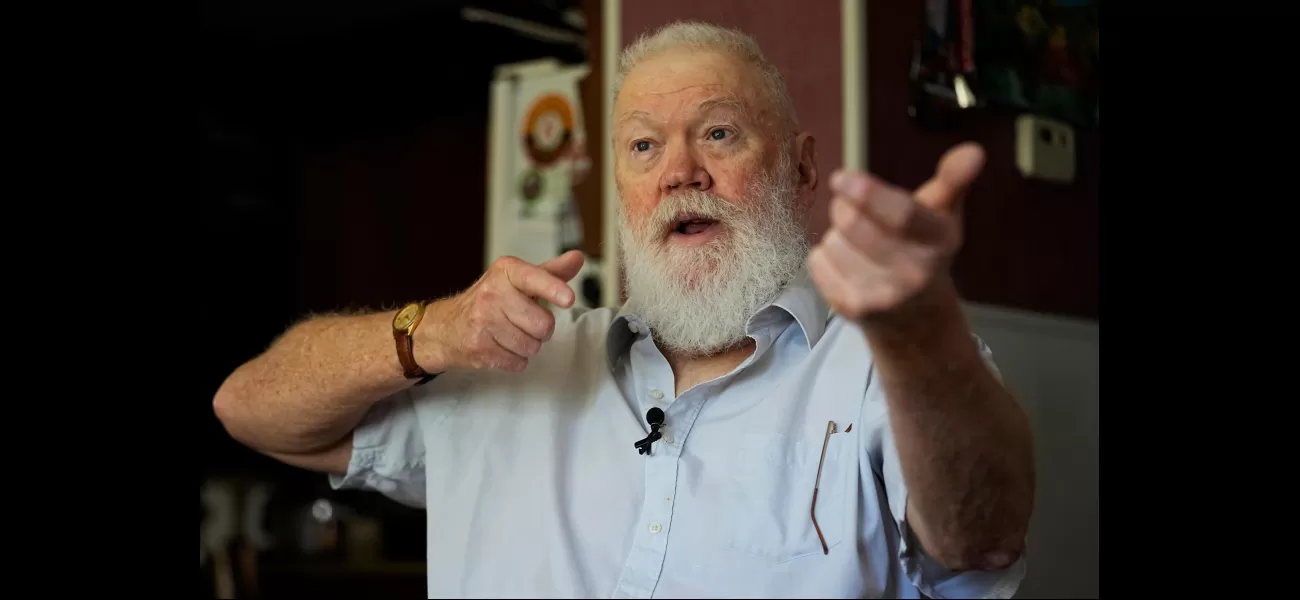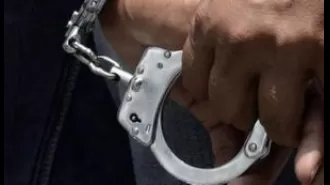In 1970, soldiers shot at Kent State students. Today's campus protests remind survivors of this event.
The 1970 Kent State shootings were a turning point in American history, marking the end of the tumultuous 1960s and sparking widespread campus protests and closures.
May 4th 2024.

As the bullets began to fly, Dean Kahler instinctively threw himself to the ground and covered his head. The Ohio National Guard had opened fire on a group of unarmed war protesters at Kent State University, and Kahler, a freshman at the time, found himself caught in the chaos.
M1 rifle rounds were hitting the ground all around him as he tried to process the terrifying situation unfolding before him. And then, it happened - a sharp, searing pain in his side. "It felt like a bee sting," Kahler recalled, over 50 years later. But it was far worse than that - a bullet had pierced his lung, shattered three vertebrae, and damaged his spinal cord, leaving him paralyzed.
The shooting at Kent State on May 4, 1970, was a tragic and defining moment in U.S. history. Four students lost their lives and Kahler was among the eight others injured when the National Guard opened fire on the crowd following a tense exchange between protesters and troops. This event sparked widespread campus protests and led to the temporary shutdown of hundreds of colleges and universities.
Today, as students once again take to the streets to protest against another far-off war, the shootings at Kent State and their aftermath have taken on a new relevance. College administrators are faced with the challenge of balancing free-speech rights with maintaining order, and a divided public is bombarded with disturbing images of chaotic confrontations.
As Kent State prepares for its annual commemoration on May 4, Kahler watches on with a keen eye, wondering if colleges have truly learned from the mistakes of the past. "I question whether college administrators and trustees have learned any lessons from the '70s," he shared in an interview at his home outside of Canton, Ohio. "I think they're being a little heavy-handed, a little over the top."
In recent weeks, over 2,400 people at various colleges and universities across the U.S. have been arrested for participating in protests against the Israel-Hamas war. These demonstrations have been met with police in riot gear dismantling tent encampments, clearing occupied buildings, and making arrests. While the atmosphere at Kent State has remained relatively peaceful, there is an underlying tension and some students, both Jewish and Palestinian, do not feel safe.
Kent State has a long history of promoting civil dialogue, and this has remained a priority for the university's president, Todd Diacon. "Largely driven by our history, we're always and consistently about a couple of things. One is, we embrace freedom of speech," he explained. "And another thing is, we understand what happens when conversations, attitudes become so polarized that someone that doesn't agree with you becomes demonized - that that can lead to violence."
Neil Cooper, who directs Kent State's School of Peace and Conflict Studies, shared that the university has been actively engaging in debates about the war in Gaza. "There can be a temptation to try and not talk about these issues because they're too difficult, too challenging, and there's a concern that talking about them will make them worse," he said. "Our approach has been very different."
One student, Adriana Gasiewski, a junior who has been covering the protests for the school newspaper, expressed her concerns about the tense atmosphere at other universities, specifically mentioning Columbia University where the current wave of protests originated. "My biggest fear is...they bring the National Guard to Columbia and that it's like history repeating itself with May 4," she shared.
Temple University historian, Ralph Young, sees clear parallels between the current protest movement and the Vietnam war protests of the past. "I think they do compare in scale and impact," he stated, referring to the U.S. involvement in both wars. He also believes that the current crackdown on protesters will only fuel their anger and spread the protests to other campuses.
The similarities between then and now are striking. Just as in the '60s and '70s, there are accusations of "outside agitators" and claims that external groups are inciting violence. In 1970, Ohio Gov. James Rhodes accused these external groups of spreading terror, and today, New York City Mayor Eric Adams has made similar statements. It seems that history may be repeating itself.
Chic Canfora, who was present at the shootings in 1970 and now teaches journalism at Kent State, worries that campus administrators are using the actions of a few to paint all protesters as violent and dangerous. "I think that all university campuses should get together and figure out how to allow students to be what students have historically been, the conscience of America," she shared.
Gregory Payne, an Emerson College scholar and expert on the Kent State shootings, believes that the current protests against the war in Gaza will leave a lasting impact, just as the Vietnam war protests did. He hopes that there will not be a repeat of the tragic events that occurred at Kent State. "My hope is that there is not death and bloodshed like we saw in Kent State," he stated.
M1 rifle rounds were hitting the ground all around him as he tried to process the terrifying situation unfolding before him. And then, it happened - a sharp, searing pain in his side. "It felt like a bee sting," Kahler recalled, over 50 years later. But it was far worse than that - a bullet had pierced his lung, shattered three vertebrae, and damaged his spinal cord, leaving him paralyzed.
The shooting at Kent State on May 4, 1970, was a tragic and defining moment in U.S. history. Four students lost their lives and Kahler was among the eight others injured when the National Guard opened fire on the crowd following a tense exchange between protesters and troops. This event sparked widespread campus protests and led to the temporary shutdown of hundreds of colleges and universities.
Today, as students once again take to the streets to protest against another far-off war, the shootings at Kent State and their aftermath have taken on a new relevance. College administrators are faced with the challenge of balancing free-speech rights with maintaining order, and a divided public is bombarded with disturbing images of chaotic confrontations.
As Kent State prepares for its annual commemoration on May 4, Kahler watches on with a keen eye, wondering if colleges have truly learned from the mistakes of the past. "I question whether college administrators and trustees have learned any lessons from the '70s," he shared in an interview at his home outside of Canton, Ohio. "I think they're being a little heavy-handed, a little over the top."
In recent weeks, over 2,400 people at various colleges and universities across the U.S. have been arrested for participating in protests against the Israel-Hamas war. These demonstrations have been met with police in riot gear dismantling tent encampments, clearing occupied buildings, and making arrests. While the atmosphere at Kent State has remained relatively peaceful, there is an underlying tension and some students, both Jewish and Palestinian, do not feel safe.
Kent State has a long history of promoting civil dialogue, and this has remained a priority for the university's president, Todd Diacon. "Largely driven by our history, we're always and consistently about a couple of things. One is, we embrace freedom of speech," he explained. "And another thing is, we understand what happens when conversations, attitudes become so polarized that someone that doesn't agree with you becomes demonized - that that can lead to violence."
Neil Cooper, who directs Kent State's School of Peace and Conflict Studies, shared that the university has been actively engaging in debates about the war in Gaza. "There can be a temptation to try and not talk about these issues because they're too difficult, too challenging, and there's a concern that talking about them will make them worse," he said. "Our approach has been very different."
One student, Adriana Gasiewski, a junior who has been covering the protests for the school newspaper, expressed her concerns about the tense atmosphere at other universities, specifically mentioning Columbia University where the current wave of protests originated. "My biggest fear is...they bring the National Guard to Columbia and that it's like history repeating itself with May 4," she shared.
Temple University historian, Ralph Young, sees clear parallels between the current protest movement and the Vietnam war protests of the past. "I think they do compare in scale and impact," he stated, referring to the U.S. involvement in both wars. He also believes that the current crackdown on protesters will only fuel their anger and spread the protests to other campuses.
The similarities between then and now are striking. Just as in the '60s and '70s, there are accusations of "outside agitators" and claims that external groups are inciting violence. In 1970, Ohio Gov. James Rhodes accused these external groups of spreading terror, and today, New York City Mayor Eric Adams has made similar statements. It seems that history may be repeating itself.
Chic Canfora, who was present at the shootings in 1970 and now teaches journalism at Kent State, worries that campus administrators are using the actions of a few to paint all protesters as violent and dangerous. "I think that all university campuses should get together and figure out how to allow students to be what students have historically been, the conscience of America," she shared.
Gregory Payne, an Emerson College scholar and expert on the Kent State shootings, believes that the current protests against the war in Gaza will leave a lasting impact, just as the Vietnam war protests did. He hopes that there will not be a repeat of the tragic events that occurred at Kent State. "My hope is that there is not death and bloodshed like we saw in Kent State," he stated.
[This article has been trending online recently and has been generated with AI. Your feed is customized.]
[Generative AI is experimental.]
0
0
Submit Comment





